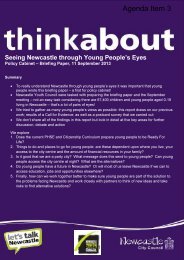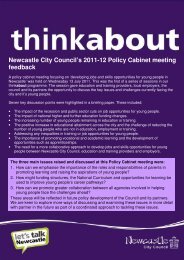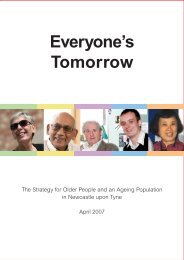NEWCASTLE'S MUSICAL HERITAGE AN INTRODUCTION By ...
NEWCASTLE'S MUSICAL HERITAGE AN INTRODUCTION By ...
NEWCASTLE'S MUSICAL HERITAGE AN INTRODUCTION By ...
You also want an ePaper? Increase the reach of your titles
YUMPU automatically turns print PDFs into web optimized ePapers that Google loves.
CHAPTER THREE<br />
THE CONSPICUOUS WORTHIES<br />
Henry Purcell’s death in 1695, brought to an end what is generally referred to<br />
as the first great period of English music. After that date English music is said to<br />
have receded into the doldrums and nothing of any great event happened until<br />
the arrival of Handel in 1710. His impact was so great on the English music<br />
scene as to almost render its native composers extinct. His total output would<br />
equal that of Haydn, Mozart and Beethoven all put together. His arrival on the<br />
London music scene also gave rise to considerable rivalry between him and<br />
other successful Italian composers active in the capital at the time, which is<br />
beautifully summed up in an epigram written by the Lancashire poet, John<br />
<strong>By</strong>rom: -<br />
“Some say, compared with Buononcini,<br />
That Mynheer Handel’s but a ninny;<br />
Others aver that he to Handel<br />
Is scarcely fit to hold a candle;<br />
Strange all this difference should be<br />
‘Twixt Tweedeldum and Tweedeldee!”<br />
London was the centre of musical life and at the heart of it, following the death of<br />
Queen Anne, was the Hanoverian King, George I, whom Handel had deserted to<br />
come to England. Later, however, after he had made his peace with the<br />
monarch, it is said of the king, whose English was poor, that he enjoyed Handel’s<br />
company because they could converse in German. Handel’s reign coincided with<br />
what is commonly referred to as the period of Baroque in English musical<br />
composition; a decorative form favoured particularly by concerto composers of<br />
the time. Baroque, from the French meaning bizarre, or as Dr Charles Burney<br />
(1726-1814) the eminent music historian preferred, after visiting Germany in<br />
1773, ‘coarse and uncouth’. The worst excesses of the style, however, were<br />
never accepted in England. This period also saw a great influx of foreign<br />
musicians and a random survey taken at the time showed that half the<br />
composers active in London were foreigners, mainly from Italy, but also from four<br />
other countries. Thomas Arne (1710-1788) and William Boyce (1710-1779) are<br />
regarded today as the most outstanding English composers of this era. Arne<br />
showed some originality in the composition of his concerti and is remembered<br />
today mainly for his Shakespearean songs and the fact he composed Rule<br />
Britannia. The fame of Boyce, who is generally regarded as the better of the two,<br />
rests largely on his three volumes of Cathedral Music. In their day both of these<br />
16

















